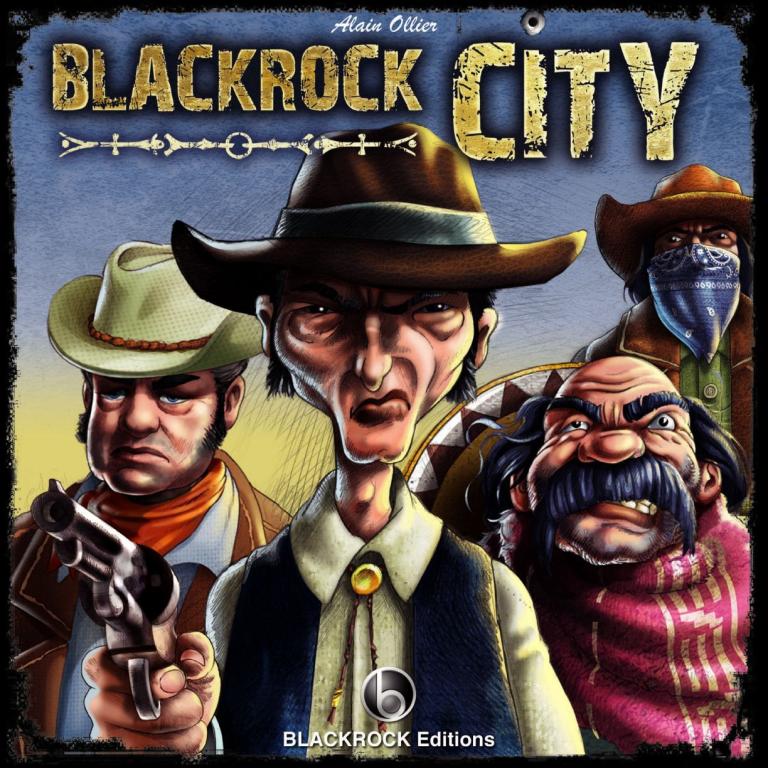Blackrock City

Blackrock City
In Blackrock City, you are the chief of your group of outlaws, and you want to claim as much gold and silver as possible by attacking cities and stagecoaches. You will have to be clever to estimate the number of outlaws needed to attack – and watch out for the Sheriff and your opponents!
The game is played in rounds. Each round, players bid on the right to perform the next bank robbery by placing a number of outlaws in the center of the playing area; each player starts with eight outlaws. Alternatively a player can skip the round or postpone an attack until after other players bid, but doing so will cause one or more of his outlaws to become wounded. When a player bids outlaws, the sheriff token moves a number of city tiles equal to the number of outlaws bid (in most cases). If a sheriff lands on a player's Chief of the Outlaws token – as these tokens are located on city tiles and not used for bidding – one of that player's outlaws is wounded.
The winner of the bid attacks a city, most likely netting him gold and possibly giving him new outlaws (as they are freed from that city's prison), but which city is attacked is determined by the difference between the winning bid and the lowest bid. Thus, bids from the other players will influence the winner's gains – and if the winner lands on the city tile where the sheriff is located, he gets nothing. The player with the second highest bid attacks the stagecoach and gains one silver.
If a player claims something from a city tile, it's flipped over and now has a different power for the remainder of the game, allowing a player who lands on the tile to steal gold or silver cubes from an opponent or wounding one of that player's outlaws. After each round, players collect the outlaws they used to bid and "wound" the healthy outlaws by flipping them over to their wounded side. A wounded outlaw who is wounded again is removed from the game. (Prisoners come into the game wounded, so they can be used only once.)
The game ends when no player has any outlaws remaining or all players refuse to bid in a given round. The player who has collected the most gold and silver wins!
The game is played in rounds. Each round, players bid on the right to perform the next bank robbery by placing a number of outlaws in the center of the playing area; each player starts with eight outlaws. Alternatively a player can skip the round or postpone an attack until after other players bid, but doing so will cause one or more of his outlaws to become wounded. When a player bids outlaws, the sheriff token moves a number of city tiles equal to the number of outlaws bid (in most cases). If a sheriff lands on a player's Chief of the Outlaws token – as these tokens are located on city tiles and not used for bidding – one of that player's outlaws is wounded.
The winner of the bid attacks a city, most likely netting him gold and possibly giving him new outlaws (as they are freed from that city's prison), but which city is attacked is determined by the difference between the winning bid and the lowest bid. Thus, bids from the other players will influence the winner's gains – and if the winner lands on the city tile where the sheriff is located, he gets nothing. The player with the second highest bid attacks the stagecoach and gains one silver.
If a player claims something from a city tile, it's flipped over and now has a different power for the remainder of the game, allowing a player who lands on the tile to steal gold or silver cubes from an opponent or wounding one of that player's outlaws. After each round, players collect the outlaws they used to bid and "wound" the healthy outlaws by flipping them over to their wounded side. A wounded outlaw who is wounded again is removed from the game. (Prisoners come into the game wounded, so they can be used only once.)
The game ends when no player has any outlaws remaining or all players refuse to bid in a given round. The player who has collected the most gold and silver wins!
Player Count
2
-
4
Playing Time
30
Age
10
Year Released
2012
Newest Review
Remote video URL